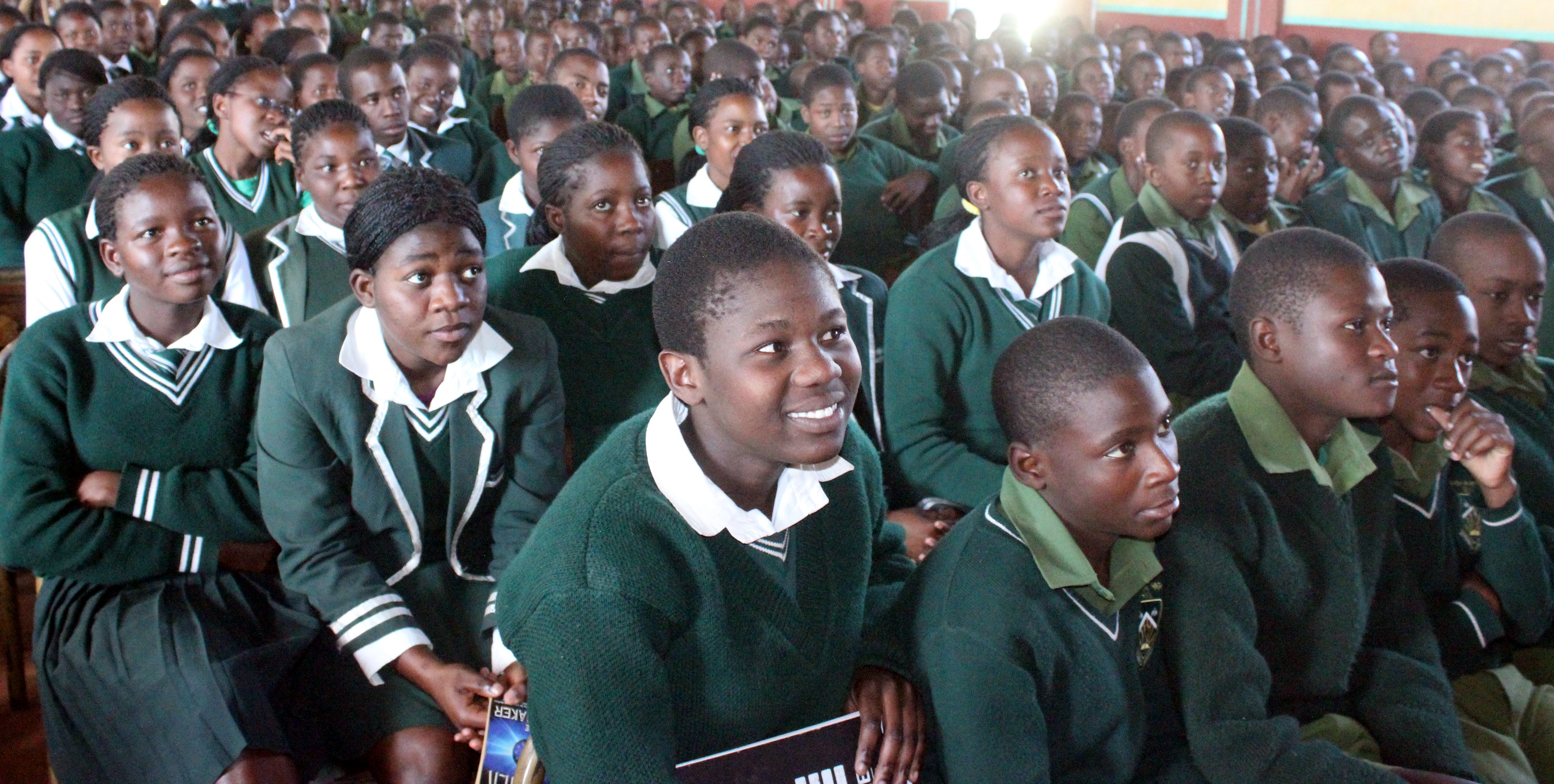Gwango Lodge joins STEM bandwagon

Leonard Ncube
THE buzzword in the education sector in most parts of the country today is STEMITISE. STEMITISE is a contrived verb from the acronym STEM that encourages the teaching of Science, Technology, Engineering and Mathematics subjects (STEM) in schools. Some schools in Hwange District have
already started implementing the programme, courtesy of a local lodge, Gwango Elephant Lodge.
The STEM campaign has its origins in the declaration by President Robert Mugabe on the importance of revolutionising education if the country is to industrialise.
Zimbabwe is banking on STEM to produce learners with cutting-edge skills that make them relevant nationally and competitive globally.
Ever since government, through the ministry of Higher and Tertiary Education, rolled out STEM, the Hwange-based lodge came up with a number of initiatives to promote the teaching of Science and Mathematics in schools.
In implementing the programme, Gwango Elephant Lodge, situated at the edge of Hwange National Park in Mabale area, started the Gwango STEM Initiative (GSI).
GSI is a rapid results project supporting the Zimbabwe Agenda for Sustainable Socio-Economic Transformation (Zim-Asset).
Some of Gwango programmes on STEM include career pathways events, GSI Scholars and educator workshops and tourism linkages.
GSI hosted the first annual Career Pathways event at Marist Brothers High School in Dete where about 900 pupils aged between 13 and 15 and their teachers from nine schools participated.
Most of the schools lack science laboratories, hence their challenges in embracing STEM as engineering, chemistry and physics are not part of their school curriculum.
The Project founder, Elisabeth Pasalk, says GSI is the answer to the district schools’ science challenges.
She says GSI’s objective is to increase the number of pupils pursuing STEM subjects in schools.
“The idea came after realisation that there is a dearth of students pursuing science subjects in schools and we eventually collaborated to create GSI,” said Pasalk.
The initiative brings together multi players with a shared vision of developing Hwange District and Matabeleland North province through sciences.
A committee has been set up comprising traditional leaders, education officials and Gwango’s representatives.
The schools that are already participating are Dampa Secondary School, Detema Secondary, Kamativi Secondary, Lupote Secondary, Marist Brothers High School, Makwandara Secondary, Nechilibi Secondary, Songwa Secondary and Nembila Secondary School.
Pasalk said the goal of the Career Pathways was to engage and inspire pupils to learn about STEM, get excited about it and pursue related professions.
“Pupils learn by seeing, listening and interacting with STEM content. As part of the event, exhibitors acted as ‘STEM role models’ creating a range of fun and interactive hands-on learning activities ranging from awccounting to zoology,” she said.
The government is paying full school and boarding fees for all excelling pupils who register for STEM subjects at public schools at Advanced Level this year through a $4 million grant set aside from the Zimbabwe Manpower Development Fund (Zimdef). Gwango’s programme, however, will have two Form 1 pupils, a boy and a girl, being selected from each participating school to participate in the prestigious GSI Scholars Programme each year.
They will receive intensive supplementary STEM education throughout the year.
A world-class laboratory accessible to all GSI Scholars will be established in the district.
The government has also incentivised schools with a STEM bus and $100,000 cash if they endorse the application forms for their pupils who should be captured by the technology officer in the province of their school.
GSI seeks to achieve its goals by harnessing wildlife related programmes after realisation that lack of STEM awareness within the local communities due to socio-economic status was perpetuating the conservation challenges such as poaching.
“Gwango Elephant Lodge, which began constructing three elegant Forest Chalets and three luxury Tree Top Villas in 2014 scheduled to open late this year, seeks to boost tourism and effectively protect wildlife and their habitat in Hwange by raising conservation awareness. We hope this can be achieved by expanding STEM learning,” Pasalk said.
The lodge has also initiated a heritage centre to document the history and culture of Nambya and Tonga people who are prevalent in the area.
The facility maintains daily contact with the surrounding communities to facilitate capacity building efforts and educational initiatives.
“There is a growing interest in heritage and cultural tourism worldwide. Cultural tourism can help highlight and interpret the heritage of a community while communities can participate by providing an authentic participatory tourist experience resulting in jobs and economic development,” Pasalk said.
This is the government’s effort to address shortage of 1,521 Science and Mathematics teachers in the country due to the brain drain.
Midlands and Matabeleland provinces are the hardest hit by the challenge of science teachers’ shortage.
GSI, Pasalk says, seeks to get sponsorship from tourists who could bring in textbooks during their visits.
Pasalk said there was also a need to include people living adjacent to tourism areas because they are critical in protection and sustainable use of natural resources, including wildlife and habitat.
The initiative by Gwango challenges other operators to do even more in giving back to the community to help reposit Zimbabwe as a leading tourism destination.
Tourism plays a key role in employment creation, payment of taxes or government levies and generation of income for tourism businesses and STEMITISING education.
Revenue from the tourism sector can be used to develop other industries such as banking, agriculture, manufacturing and retail sectors while also giving rise to infrastructural development, improving transport networks and superstructure and above all could improve the general quality of life and education through STEM.
Chief Dingani-Nelukoba says the Hwange community welcomes the project.
The traditional leader is conscientising people in his area to take education seriously and enrol for science subjects in teachers’ colleges and tertiary institutions.
“As a community we welcome the project and really commend Gwango for their sterling work. The idea is good and we are all behind it,” he said.
Chief Dingane-Nelukoba said Gwango’s commitment to helping uplift the Hwange community was amazing given that they are still fairly new in the business.
He said: “They just started their lodge but are already giving back to the community. It’s our hope that the project is sustained. We’ll support their initiative by ensuring that our children don’t drop out of school. We will encourage them to enrol at teachers’ colleges and train as science teachers.”
The STEM programme has gone viral across all media platforms as the government is committed to seeing it succeed.
After launching the programme, Higher and Tertiary Education Minister Professor Jonathan Moyo and his Deputy Godfrey Gandawa have been working tirelessly to set the programme in motion.
Prof Moyo is on record as saying there was no going back on STEM as students who failed Mathematics would not be allowed entry into tertiary institutions.
STEM is not for failures, and those that perform dismally risk being excluded, Gandawa said recently.
“They’ll have to maintain a satisfactory performance, at least a minimum of nine points by the end of the year. Those who don’t perform well will lose it.
We’re not promoting mediocrity. The fact that we’re investing in this programme means we’re serious as a government and we want to produce the scientists we require at the end of the day,” he said.










Comments